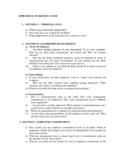| dc.description.abstract | The purpose of the study was to investigate the relationship between leadership
development and employee commitment in the banking sector, using a case study of Bank
of Africa Uganda Ltd. The study used a case study research design. Primary data were
collected using three tools questionnaires, interview guide and observation. Secondary
data were gathered through review of related literature from BOA-U HRM Manuals,
published reports in the UMI library and research reports on the internet. A sample of 138
BOA-U staff were chosen. The response rate was 100%. The quantitative data were
edited, coded and entered into the SPSS data analyzed, after which it was described and
summarized using descriptive statistics (frequencies and percentages). To show whether
there was relationship between the variables and measure the magnitude of that
relationship, Pearson correlation coefficient was used. The findings revealed that there
was a weak positive correlation (r = .260, p = .010) between career development and
employee commitment. There was a significant correlation (r = .173, p = .002) between
team building and employee commitment. There was a significant correlation (r = .189, p
= .001) between communication and employee commitment. Renumeration weakened the
relationships between leadership development and employee commitment. Based on the
findings, it is recommended that for career development and employee commitment,
management increases the sponsorship slots available for staff to study and develop their
career, give subsidized study loans to staff and encourage them to go for further studies.
On team building and employee commitment, management should organize functions that
call for staff teamwork in order to achieve a common goal such as customer care week,
staff durbar and end of year parties, when drawing the annual training programs, all staff
should be involved in the needs assessment exercise, so that they are given chance to
point out their training needs, also management should have particular interest in ensuring
that these programs are implemented instead of just staying on paper. On communication
and employee commitment: management should establish proper and effective
communication channels in order to improve both upward and down ward
communication. On pay and rewards and employee commitment: management should
adopt a more transparent remuneration system and employee benefit system so that
rewards and incentives are commensurate to staffs performance. | en_US |




